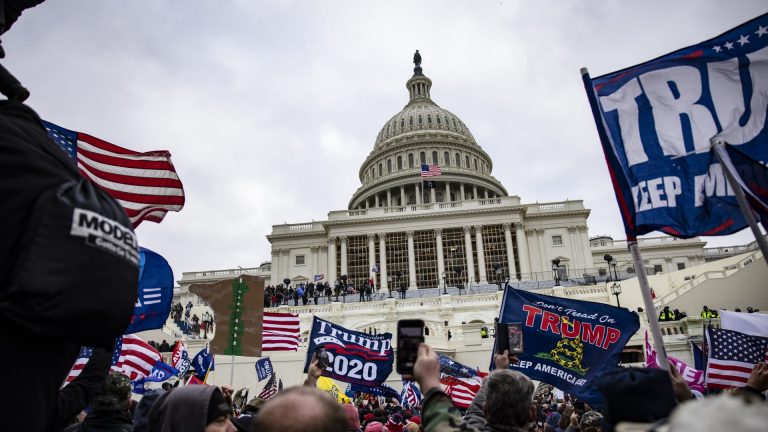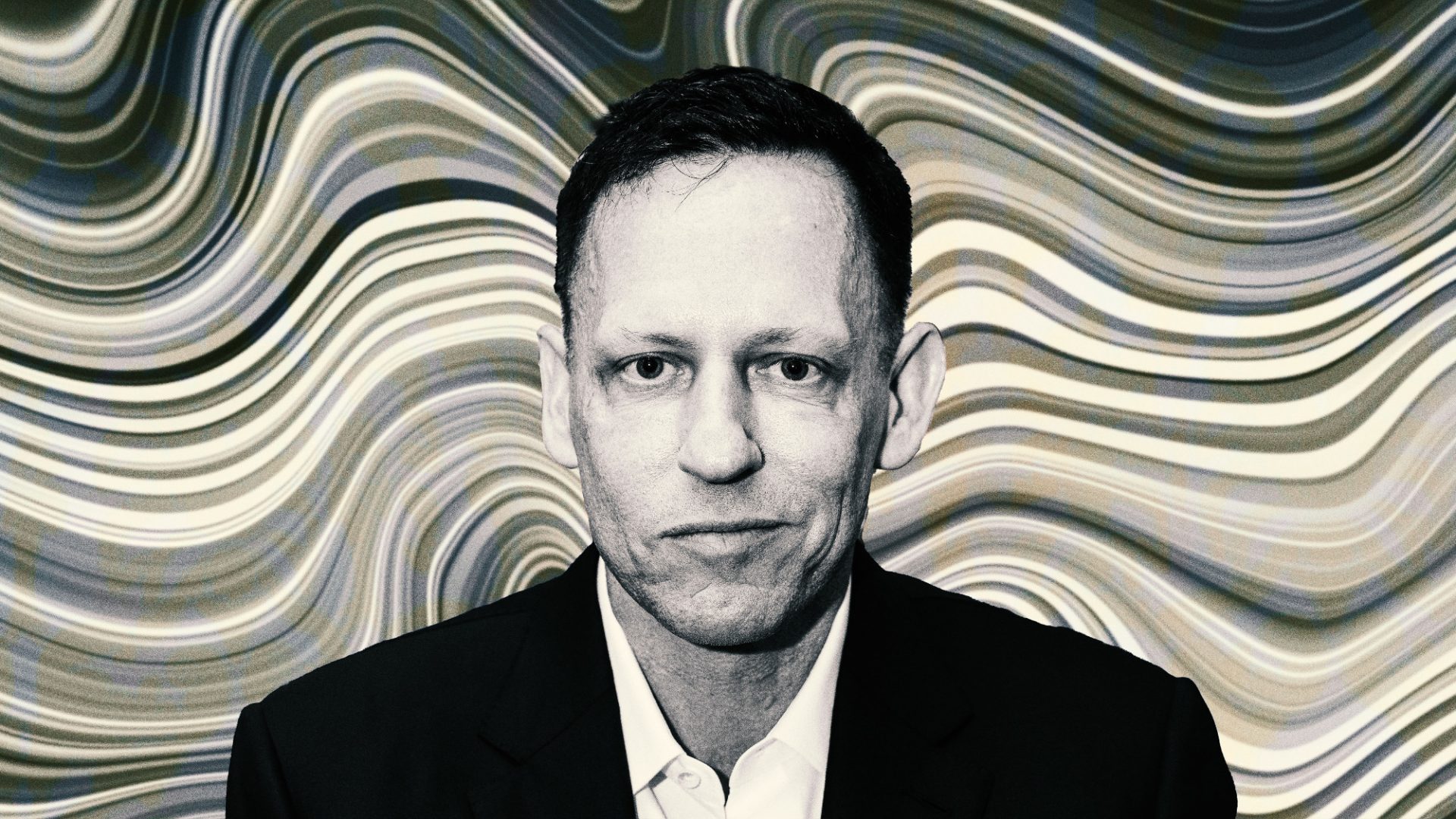Is Greta Thunberg the Antichrist? Peter Thiel, the tech tycoon and Silicon Valley guru, thinks she might well be.
In a podcast interview with the New York Times columnist Ross Douthat last month, he claimed that the Antichrist would arise by stoking fear of environmental disaster, AI, nuclear weapons and other existential perils: “[I]f we’re going to have this frame of talking about existential risks, perhaps we should also talk about the risk of another type of a bad singularity, which I would describe as the one-world totalitarian state. Because I would say the default political solution people have, for all these existential risks, is one-world governance… The way the Antichrist would take over the world is you talk about Armageddon nonstop… In our world, it’s far more likely to be Greta Thunberg.”
Why should we care that a multi-billionaire venture capitalist has persuaded himself that the 22-year-old climate and peace activist is the evil harbinger of the End Times? Because, like it or not, Thiel is a man of immense influence.
A co-founder of PayPal and the first outside investor in Facebook, the 57-year-old, who was born in Frankfurt but migrated to the US when he was an infant, now chairs Palantir Technologies, the mighty software and services company, and the venture capital firm Mithril Capital.
Eight years before his fellow tech oligarchs flocked to Mar-a-Lago, he took a punt on Donald Trump and spoke at the 2016 Republican national convention in Cleveland, Ohio. “I am proud to be gay,” he declared. “I am proud to be a Republican. But most of all, I am proud to be an American.”
In the 2022 mid-terms Thiel spent $35m on 16 Republican candidates – 12 of whom won – including a record $15m on JD Vance’s successful campaign to become senator for Ohio. Though he has since dialled down his political spending, his reach within the second Trump administration remains immense – not least to the vice-president, and leading candidate for the 2028 presidential nomination.
Unlike his blowhard friend and protege Elon Musk, Thiel is authentically erudite and often has interesting and contrarian things to say. In Zero to One: Notes on Startups or How to Build the Future (2014), he argues that the essence of entrepreneurial success is not competition but uniqueness: a great company “earns a monopoly by solving a unique problem” and is “a conspiracy to change the world”.
Thiel also has a gift for striking and sometimes alarming aperçus. In 2009, he wrote: “I no longer believe that freedom and democracy are compatible”. A refrain in his writing and public speaking has been the complaint that technology in the physical world, as opposed to the digital realm, has stagnated unforgivably: “We wanted flying cars, instead we got 140 characters”. Add into the mix his generally bleak view of humanity’s moral fibre in the 21st century: “We live in a world in which courage is in less supply than genius”.
Though Thiel’s identification of Thunberg as a probable agent of Satan has naturally attracted attention – and derision – his fascination with theology in general and Armageddon specifically is not new. Raised an evangelical Christian, he was profoundly influenced by his teacher and mentor at Stanford, the late historian, philosopher and literary critic René Girard, who wrote extensively about the Apocalypse and the Antichrist.
In I See Satan Fall Like Lightning (2001), Girard said: “The Antichrist boasts of bringing to human beings the peace and tolerance that Christianity promised but has failed to deliver. Actually, what the radicalisation of contemporary victimology produces is a return to all sorts of pagan practices: abortion, euthanasia, sexual undifferentiation, Roman circus games galore but without real victims, etc.”
Thiel pursues a similar logic, arguing that the “hyper-Christianity” of wokeness is a deviously wicked means of leading humanity to perdition. As he put it in an interview with Peter Robinson at Stanford’s Hoover Institution last October: “The Antichrist pretends to be greater than Christ. Hyper-Christian, ultra-Christian, and then maybe only ultimately, deeply, deeply anti-Christian”.
In this context, he often cites two 20th-century novels about the End Times: Vladimir Solovyov’s A Short Story of the Antichrist (1900) and Robert Hugh Benson’s Lord of the World (1907), the latter being a firm favourite of Popes Benedict XVI and Francis. In Thiel’s account, both books suffer from a “plot hole” – namely, a plausible means by which the dominion of a charismatic figure would be accepted.
But this plot hole has been closed, he argues, by contemporary fear of multiple existential perils. “[T]he implicit solution,” he told Robinson, “is to lean into a sort of very non-democratic one world state that will highly regulate and stop these technologies… The natural pushback on this is: we’ll avoid Armageddon by having a one world state that has real teeth, real power – and the Biblical term for that is the Antichrist”.
Suggested Reading

Coffee, cake and fascism: welcome to Trump’s America
His (contested) reading of St Paul’s First Letter to the Thessalonians, chapter 5, is that the slogan of the Antichrist will be “peace and safety” – or “peace and tolerance” as Girard rendered it. And it is here that the politically engaged tech tycoon swoops down from high-flown apocalyptic theology to the very specific concerns of the Trump-supporting super-rich.
As he put it to Robinson: “I wonder what would be the marginal tax rates in a one world state where people couldn’t move. I suspect they would be quite high. It sort of would be like East Germany, with no escape.”
And to Douthat: “[W]e’ve submitted to the FDA [US Food and Drug Administration] – it regulates not just drugs in the US but de facto in the whole world, because the rest of the world defers to the FDA. The Nuclear Regulatory Commission effectively regulates nuclear power plants all over the world.”
From the incense smoke of Biblical verses and millenarian prophecies emerges a rather more practical and self-interested agenda. What the tech oligarchy fears most is the spread of regulation – not least from Europe – to constrain their ambitions in AI, cryptocurrencies, surveillance systems, defence technology and ever more powerful social media.
In this respect, Thiel’s message is the theological counterpart to Vance’s astonishing speech at the Munich Security Conference in February, in which he railed against European “hand-wringing”, the “old entrenched interests hiding behind ugly Soviet-era words like misinformation and disinformation” to impose digital censorship, and – you’ve guessed it – “Greta Thunberg’s scolding”.
Hence, the pressure that the Trump administration is exerting upon other nation-states to roll back proposals for tech regulation. Though the UK has not yet ditched its digital services tax, prime minister Mark Carney last month rescinded Canada’s equivalent levy in his negotiations over US tariffs. Trump is making similar demands in his trade talks with the EU: the bonfire of global regulation is now at the heart of US foreign policy.
To an extent that is hard for European liberals to understand, Thiel is also – literally – preaching to the choir with his warnings to Americans of the Antichrist and the Apocalypse. According to a survey by the Pew Research Center in 2022, 39% of adults in the US believe “we are living in the end times”.
For many millions of evangelical Christians, the sequence of events is foretold in a series of key Biblical passages: not only the Book of Revelation, but Ezekiel 38 (“set your face against Gog, of the land of Magog”), Daniel 7 (“in my vision at night I looked, and there before me was a fourth beast – terrifying and frightening and very powerful”) and the First Epistle of John 7 (“many deceivers, who do not acknowledge Jesus Christ as coming in the flesh, have gone out into the world. Any such person is the deceiver and the Antichrist”).
From these disparate texts has been forged a narrative in which there will be a cosmic battle with Israel at its heart; true believers will be taken up to heaven in the Rapture; and the Antichrist will reign over those left behind before the return of Christ.
Though Trump is scarcely a figure of piety, he has gone out of his way to please those who believe such eschatological prophecies. Central to this political strategy was his decision to move the US embassy in Israel from Tel Aviv to Jerusalem. At its opening in May 2018, the televangelist John Hagee delivered the benediction and declared that the ancient city was the place “where the Messiah will come and establish a kingdom that will never end.”
In common with his fellow apocalypticists, Hagee has long called for war with Iran. It was to this demographic that Trump was appealing in his remarks after US bombers attacked the nuclear facilities at Fordo, Natanz and Isfahan: “I want to just thank everybody, and in particular, God. We love you, God.” To evangelical ears, this was, so to speak, a God whistle: a sign that Trump, who has been more explicitly religious in his rhetoric since surviving the assassination attempt at Butler, Pennsylvania, a year ago, is pursuing a divine plan.
Context, in other words, is all. One of my favourite books is Norman Cohn’s The Pursuit of the Millennium: Revolutionary Millenarians and Mystical Anarchists of the Middle Ages (1957), a classic account of apocalyptic cults and their interactions with social struggle. All such movements were led by a propheta – a self-styled political and social alchemist who would seek to present a moment in history as “different in kind from all other struggles… a cataclysm from which the world is to emerge totally transformed and redeemed.”
In Cohn’s terms, Thiel is presenting himself as a digital propheta. His growing preoccupation with the Antichrist – which he has explored in a series of private lectures at Oxford, Harvard and the University of Austin – is a highbrow version of MAGA End-Times theology. But it also seeks to gentrify the broader attack upon “globalism”: the notion that a totalitarian “New World Order” is being imposed by a conspiracy of godless elitists.
Suggested Reading


Trump’s army makes America poor again
As Richard Hofstadter wrote in his seminal essay, The Paranoid Style in American Politics (1964): “The paranoid spokesman sees the fate of conspiracy in apocalyptic terms – he traffics in the birth and death of whole worlds, whole political orders, whole systems of human values. He is always manning the barricades of civilisation. He constantly lives at a turning point”.
Fear of communist globalism animated the foundation by Robert Welch in 1958 of the far Right John Birch Society which alleged that President Dwight D Eisenhower was a Soviet agent, opposed the civil rights movement and attracted many racists and antisemites to its ranks.
More recently, the pandemic turbocharged claims that the world is being prepared for a “Great Reset” in which a totalitarian global government will enslave humanity and fear of plague, climate change and AI will be exploited to abolish individual liberty.
For many believers in this conspiracy theory, the vaccine was the mark of the Antichrist. All these converging strands of derangement tend towards what Umberto Eco, in his famous essay on fascism, called the “Armageddon complex”.
It is such neuroses that Thiel seeks to agitate when he makes his ridiculous claims about Thunberg. Credit is due to Douthat for pointing out the huge techno-elephant in the room: namely that, as an investor in surveillance, defence and social media technologies, he is already guilty of precisely what he claims Thunberg and others are plotting.
“It just seems to me that when you tell me a story about the Antichrist coming to power and using the fear of technological change to impose order on the world,” Douthat said, “I feel like that Antichrist would maybe be using the tools that you are building… Isn’t that a concern?”
Thiel’s response – “I obviously don’t think that that’s what I’m doing” – did not address Douthat’s excellent point: that a young Swedish activist sailing to Gaza is probably doing less to imperil the world than a tycoon funding cutting-edge military technology and the most advanced data capture services in history.
In the end, though, I doubt Thiel minds much, if at all. He postures as a dour, careworn seer, weighed down by the burden of profound insight. Yet in his appearances on podcasts (including three-and-a-half hours on The Joe Rogan Experience in August), his notionally off-the-record but widely reported lectures, and his ill-concealed desire to “own the libs” with ever more lurid warnings, he gives the game away.
In his own way, he is as much a showman as Trump; as hungry for clicks and attention; a shock jock with a stratospheric IQ. Tech titans relish their access-all-areas right to intervene when they choose and then recede into the shadows. To an insulting degree, it is performative and capricious; a strategy, one suspects, to ward off personal boredom.
Milton warned us of the immense charismatic appeal of Lucifer. But, in this case, we need not worry. Peter Thiel is not the Antichrist. He’s a very naughty boy.




